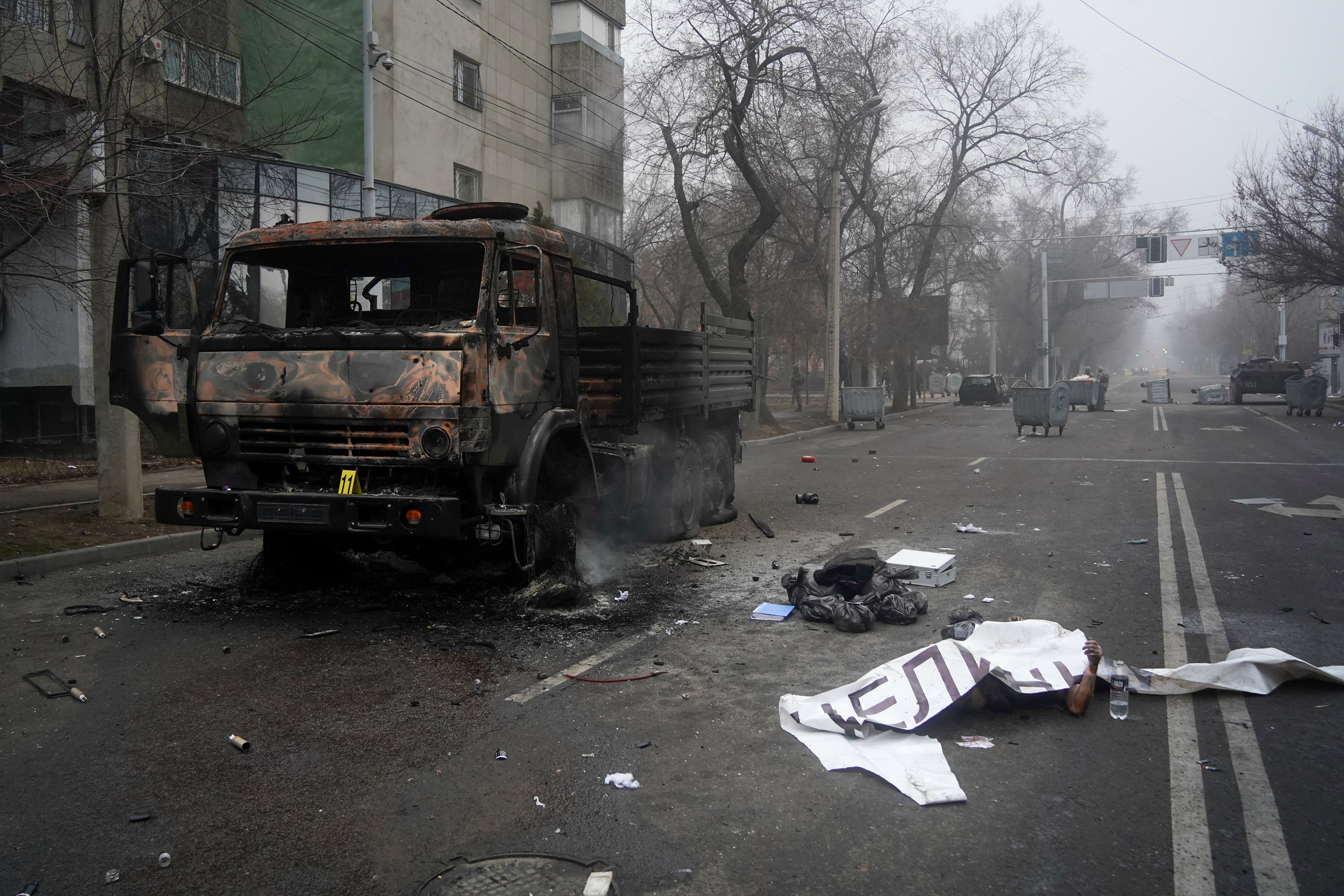Kazakhstan’s president says ‘coup’ attempt defeated as Putin vows to stop ‘colour revolutions’
Russian leader says recent unrest was exploited by ‘external forces’

Kazakhstan’s president Kassym-Jomart Tokayev has claimed his country has defeated a coup attempt following widespread unrest last week.
In a speech to an online meeting of the Russian-led military bloc CSTO (the Collective Security Treaty Organisation), Mr Tokayev said that order had now been restored in Kazakhstan, but that the hunt for “terrorists” was continuing.
“Under the guise of spontaneous protests, a wave of unrest broke out ... It became clear that the main goal was to undermine the constitutional order and to seize power. We are talking about an attempted coup d’etat,” he said.
Following Mr Tokayev’s speech, Russian president Vladimir Putin said the unrest in Kazakhstan had been exploited by “destructive internal and external forces” and insisted that the Russian-led CSTO military alliance would not allow other forces to destabilise the region.
The events were not the first and would not be the last attempt to meddle in the region, he said, and he insisted that the CSTO would not allow further “colour revolutions” to take place, a reference to several uprisings in ex-Soviet or Soviet-controlled countries over the last few decades.
He added that the deployment of Russian troops had prevented armed groups from undermining the basis of power in Kazakhstan and would be withdrawn once their mission was complete.
Meanwhile, China announced it was willing to increase “law enforcement and security” cooperation with neighbouring Kazakhstan, and to help oppose interference by “external forces”.
Foreign minister Wang Yi made the comments in a call to Kazakhstan’s foreign minister Mukhtar Tleuberdi, according to the Chinese foreign ministry.
“Recent turmoil in Kazakhstan shows that the situation in central Asia is still facing severe challenges, and it once again proves that some external forces do not want peace and tranquillity in our region,” the ministry quoted Mr Wang telling Mr Tleuberdi.
Experts believe China is worried about instability in its neighbouring country, which could threaten energy imports and Belt and Road projects (China’s strategy for global infrastructure development) as well as security in its western Xinjiang region, which shares a 1,770km (1,110 mile) border with Kazakhstan.
Demonstrations against a fuel price rise began a week ago before spiralling into a wider protest against Mr Tokayev’s government and the man he replaced as president, 81-year-old Nursultan Nazarbayev, who ruled from 1990 until 2019.
Protests were reported across the country but appeared most severe in the former capital, Almaty. Fierce clashes took place between protesters and police.
President Tokayev announced a shoot-to-kill order as demonstrations gathered momentum, a move criticised by the US. He also denounced those on the streets as “terrorists”, a claim denied by ordinary Kazakhs, who said they were protesting because of genuine anger at their rulers.
It was reported on Monday that the internet had been restored in Almaty after a five-day blackout.
The protests were the worst experienced in Kazakhstan since it gained independence 30 years ago.
The country’s health ministry said on Sunday that 164 people had been killed in the civil unrest, including three children.
Kazakhstan’s interior ministry reported that a total of 7,939 people had been detained across the country. The National Security Committee, Kazakhstan’s counter-intelligence and anti-terrorism agency, said on Monday that the situation in the country had “stabilised” and was “under control”.
The Kazakhstan uprising has rocked an already volatile region, and is the latest example of unrest in a country bordering Russia. In 2020, protests took place after the Belarus leader Alexander Lukashenko, who has ruled since 1994, claimed victory in a disputed presidential election. And talks are due to begin this week on the security situation in Ukraine.
Mr Tokayev said that the large scale “counterterrorism” operation would soon end, along with the CSTO mission.
“The main blow was directed against [the city of] Almaty. The fall of this city would have paved the way for a takeover of the densely populated south and then the whole country,” he said. “Then they planned to seize the capital.”
Mr Tokayev defended his decision to invite Russian-led troops into the country, and said that doubts over the legitimacy of that mission stemmed from a lack of information.
Kazakhstan would soon provide proof to the international community about what had happened, he said. The authorities have declared today (Monday) a day of mourning for dozens of victims of the unrest, which was marked by unprecedented violence.
Subscribe to Independent Premium to bookmark this article
Want to bookmark your favourite articles and stories to read or reference later? Start your Independent Premium subscription today.

Join our commenting forum
Join thought-provoking conversations, follow other Independent readers and see their replies